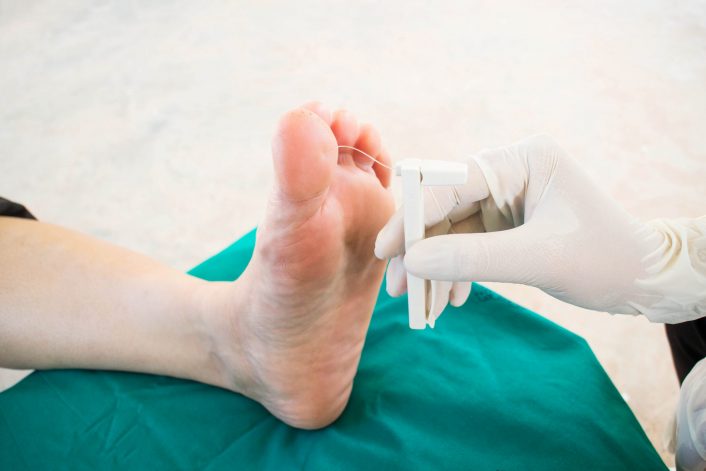
What is it?
Diabetes is not just a disease that affects your blood sugar levels. High blood sugar levels can also cause damage to the nerves and blood vessels in your feet. This puts you at risk of foot infections, ulcers and even amputation.
Nerve damage could result in an injury, wound or infections you can’t feel. And if you have less blood flowing into your feet (poor circulation), any injuries or infections to your feet will take longer to heal.
Damage is more likely if you:
- Have had diabetes for a long time
- Don’t control your blood glucose levels and they stay too high for an extended period
- Smoke – smoking also reduces blood flow to your feet
- Aren’t active
A yearly foot screening by your doctor will help to detect any issues early, before they become too serious.
What will my GP do now?
At your foot screening your GP will ask you questions about:
- Your general health and levels of activity
- Previous or current problems with your feet
- Feeling numbness, pain, prickling or burning in your feet
They will also examine your circulation and sensation by:
- Feeling foot pulses
- Testing pressure sensitivity
- Vibration and/or reflexes
Your GP is looking for any foot conditions which may lead to future problems. They may recommend a blood test to pick up other issues. Your GP can show you how to check your feet each day. Your GP may prescribe antibiotics to treat any infections, or other medication to manage foot pain.
They may refer you to a specialist clinic, or the Emergency Department of the nearest hospital if you have a lack of sensation, poor circulation, a wound or infection. They may want to see you every 3-6 months if there are any current issues with your feet.
What can I do?
Inspect your feet every day. Your GP can show you how to check your feet properly.
Protect your feet from injury by:
- Cutting and filing your nails regularly
- Avoiding barefoot walking
- Keeping feet clean
- Wearing quality footwear that fits well and protects your feet (closed shoes)
Have corns, calluses and other foot problems treated by your GP or a podiatrist. Keep yourself generally well by maintaining blood sugar level control, not smoking, and exercising regularly. Remember that you may not feel injuries or wounds. Cuts, blisters, ingrown toenails and corns may go unnoticed.
